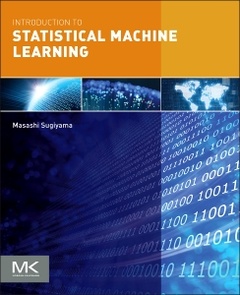Introduction to Statistical Machine Learning
Auteur : Sugiyama Masashi

Machine learning allows computers to learn and discern patterns without actually being programmed. When Statistical techniques and machine learning are combined together they are a powerful tool for analysing various kinds of data in many computer science/engineering areas including, image processing, speech processing, natural language processing, robot control, as well as in fundamental sciences such as biology, medicine, astronomy, physics, and materials.
Introduction to Statistical Machine Learning provides ageneral introduction to machine learning that covers a wide range of topics concisely and will help you bridge the gap between theory and practice. Part I discusses the fundamental concepts of statistics and probability that are used in describing machine learning algorithms. Part II and Part III explain the two major approaches of machine learning techniques; generative methods and discriminative methods. While Part III provides an in-depth look at advanced topics that play essential roles in making machine learning algorithms more useful in practice. The accompanying MATLAB/Octave programs provide you with the necessary practical skills needed to accomplish a wide range of data analysis tasks.
Part I: Introduction to Statistics and Probability1. Random variables and probability distributions2. Examples of discrete probability distributions3. Examples of continuous probability distributions4. Multi-dimensional probability distributions5. Examples of multi-dimensional probability distributions6. Random sample generation from arbitrary probability distributions7. Probability distributions of the sum of independent random variables8. Probability inequalities9. Statistical inference10. Hypothesis testing
Part II: Generative Approach to Statistical Pattern Recognition11. Fundamentals of statistical pattern recognition12. Criteria for developing classifiers13. Maximum likelihood estimation14. Theoretical properties of maximum likelihood estimation15. Linear discriminant analysis16. Model selection for maximum likelihood estimation17. Maximum likelihood estimation for Gaussian mixture model18. Bayesian inference19. Numerical computation in Bayesian inference20. Model selection in Bayesian inference21. Kernel density estimation22. Nearest neighbor density estimation
Part III: Discriminative Approach to Statistical Machine Learning23. Fundamentals of statistical machine learning24. Learning Models25. Least-squares regression26. Constrained least-squares regression27. Sparse regression28. Robust regression29. Least-squares classification30. Support vector classification31. Ensemble classification32. Probabilistic classification33. Structured classification
Part IV: Further Topics34. Outlier detection35. Unsupervised dimensionality reduction36. Clustering37. Online learning38. Semi-supervised learning39. Supervised dimensionality reduction40. Transfer learning41. Multi-task learning
- Provides the necessary background material to understand machine learning such as statistics, probability, linear algebra, and calculus
- Complete coverage of the generative approach to statistical pattern recognition and the discriminative approach to statistical machine learning
- Includes MATLAB/Octave programs so that readers can test the algorithms numerically and acquire both mathematical and practical skills in a wide range of data analysis tasks
- Discusses a wide range of applications in machine learning and statistics and provides examples drawn from image processing, speech processing, natural language processing, robot control, as well as biology, medicine, astronomy, physics, and materials
Date de parution : 09-2015
Ouvrage de 534 p.
19x23.3 cm
Disponible chez l'éditeur (délai d'approvisionnement : 14 jours).
Prix indicatif 120,27 €
Ajouter au panierThèmes d’Introduction to Statistical Machine Learning :
Mots-clés :
analytics; big data; clustering disciminative approach; generative approach; hypothesis testing; least-squares; learning models; machine learning; multi-dimensional probability distributions; multi-task learning outlier detection; probability; statistical pattern recognition; data statistics
